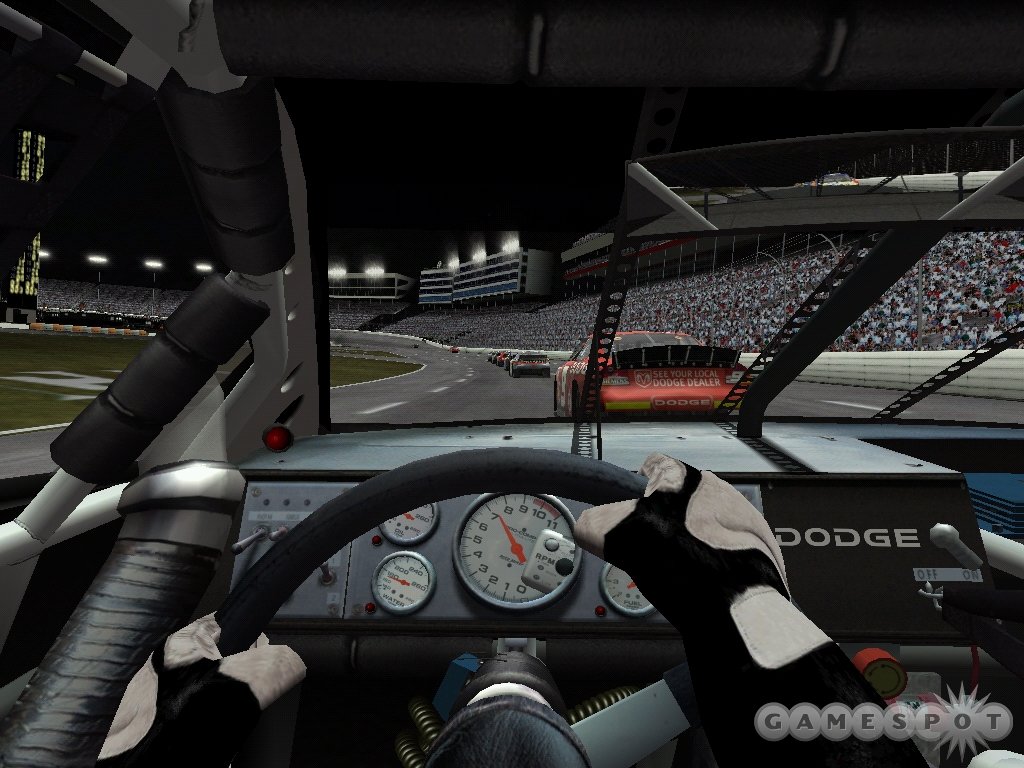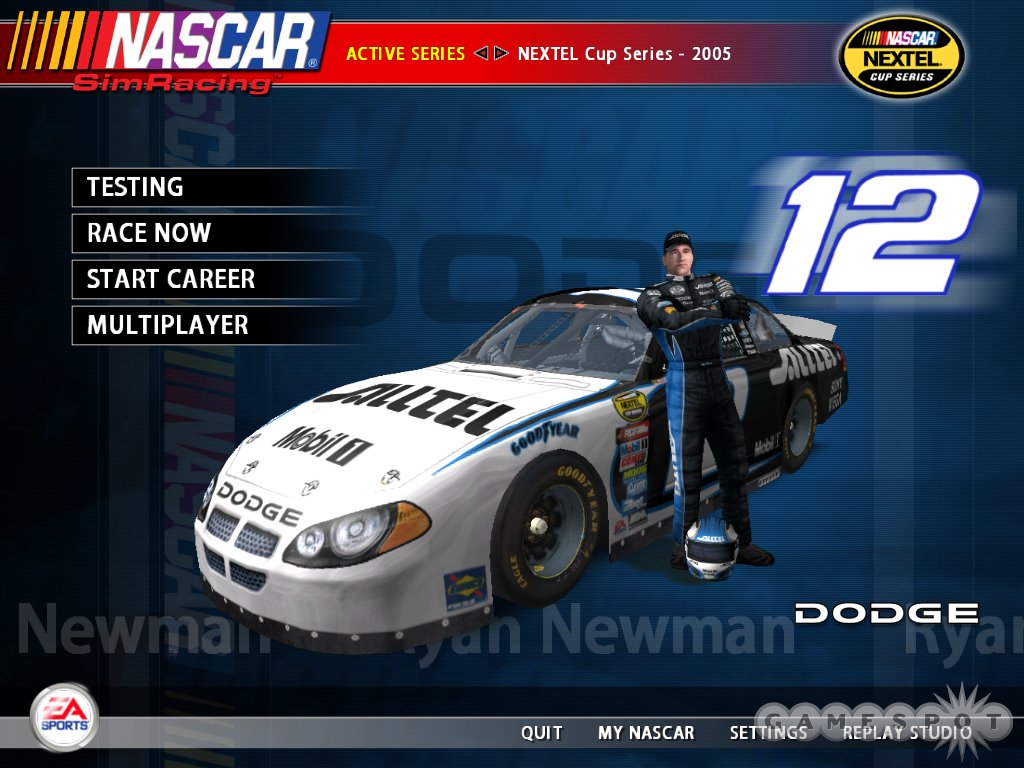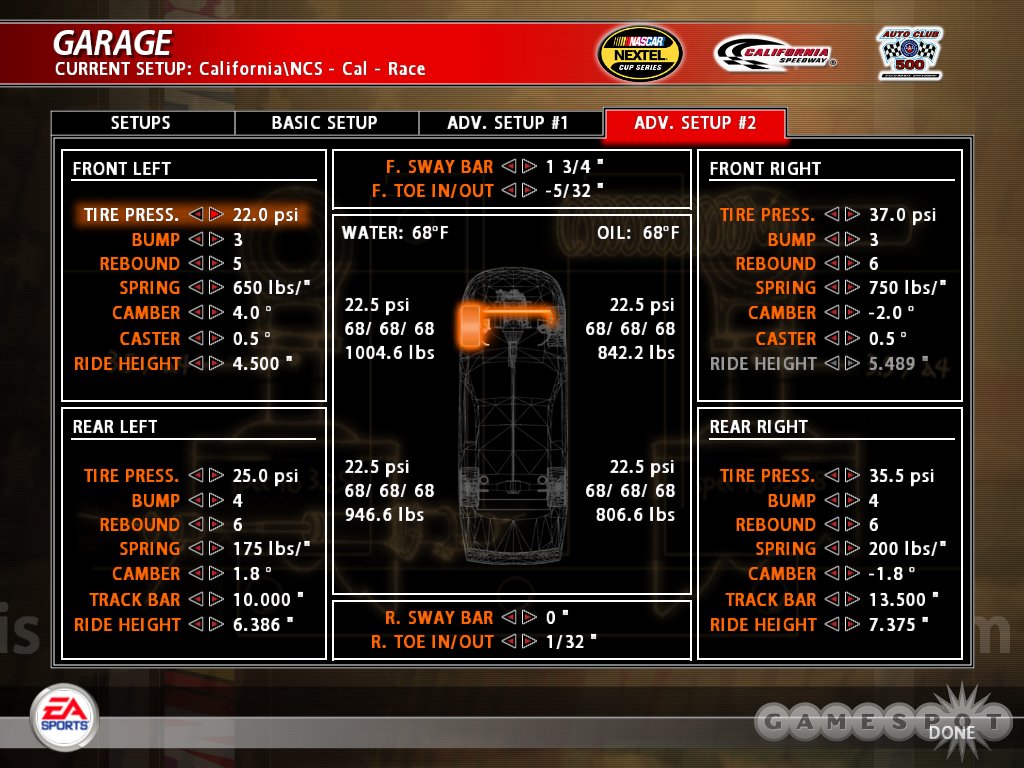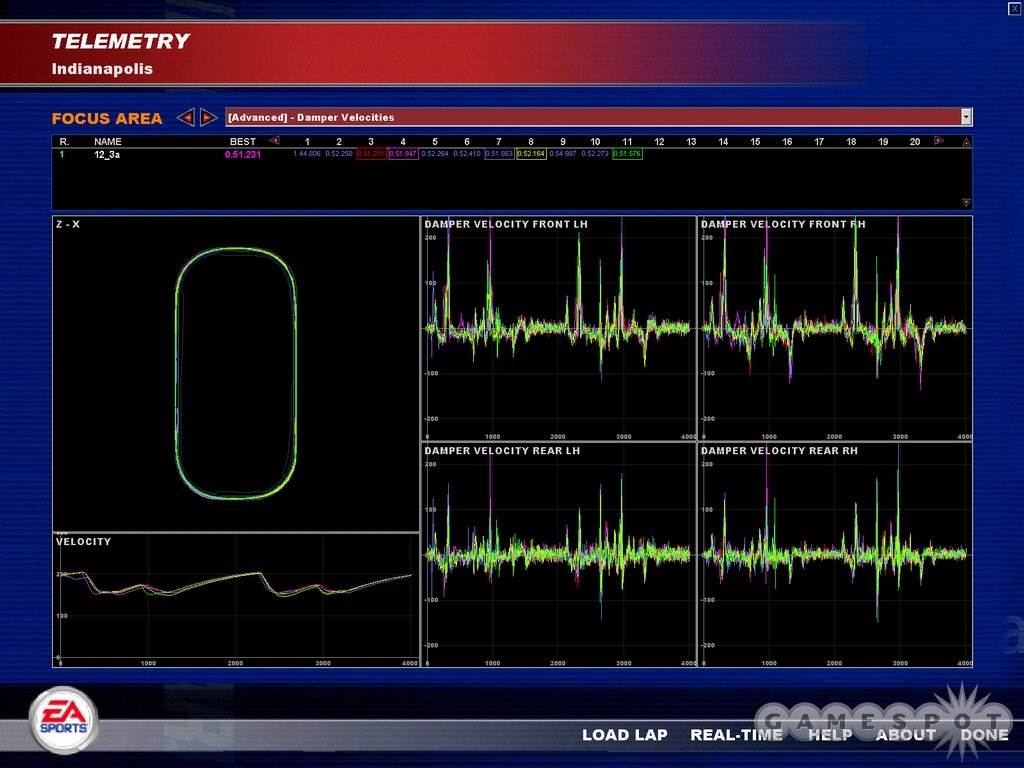NASCAR SimRacing Q&A - Overview
Line producer James Hawkins fills us in on the details regarding EA's ultrarealistic NASCAR racing game.
For years, the name associated with realistic NASCAR racing on the PC was the development studio known as Papyrus. But with Papyrus' exit from NASCAR, the new name in realistic NASCAR racing is EA Sports. With NASCAR SimRacing, the developers at EA Tiburon are looking to push the driving realism to whole new levels, and from what we've seen of the game so far, they're definitely heading in the right direction. NASCAR SimRacing is scheduled to ship next month, and we caught up with James Hawkins, the game's line producer, to get the details. You can also try out
GameSpot: Tell us about the decision that was made to make NASCAR SimRacing for PC in the wake of NASCAR 2005: Chase for the Cup on consoles. What are the main differences between the PC game and Chase for the Cup on consoles?
James Hawkins: Eighteen months ago, we decided to develop different games for the PC and the consoles. NASCAR 2005: Chase for the Cup would focus on bringing the NASCAR experience to life in a fun and interactive way designed specifically for console gamers. NASCAR SimRacing was designed to provide PC gamers with the ultimate NASCAR simulation racing experience. To make this happen, we created a new internal team here at EA Tiburon consisting of the top NASCAR developers and producers to focus exclusively on this title. For the PC, the most popular and successful racing games use complex models to simulate real-world physics and vehicle dynamics so as to re-create the experience of driving race cars as realistically as possible.

While "clans" engage in authentic virtual combat missions such as those featured in games like Battlefield 1942, like-minded "teams" of NASCAR players will get behind their steering wheels and pedals to line up on the grid and compete in virtual races, like the Daytona 500 featured in NASCAR SimRacing. Online "sim racing" is very popular on the PC, and NASCAR SimRacing enables 43 players, located anywhere in the world, to race against each other. All you need is a PC, NASCAR SimRacing, and a broadband Internet connection. The very best sim-racing drivers practice and race on a daily basis. They demand the utmost in attention to real-life details and absolute authenticity. So, as far as they are concerned, their races are real.
The name NASCAR SimRacing is indicative of the key difference between our new PC experience and NASCAR 2005: Chase for the Cup. NASCAR SimRacing is a simulation designed by veterans and tested by real NASCAR drivers.
GS: So you do work with real-life NASCAR drivers? What kind of feedback have they given? And is it true that some drivers will use the game to practice for the real thing?
JH: We have worked with real drivers, including Ryan Newman and Dale Earnhardt Jr. Most of the feedback from the drivers has been focused on the core driving experience and accuracy of the vehicle dynamics. For example, Newman pointed out very early in our development cycle that the engine was generating too much negative torque during periods of deceleration. Using his feedback, we were able to correct the model and make it real.
It is a real testament to NASCAR SimRacing that the real drivers we have worked with are able to configure their cars via the "garage" screens with settings they raced with in real life, and then experience the game react exactly as they expect. By working with real drivers, we have also been able to ensure that specific details, such as bumps, severity of curbs, length of safe walls, and so on, are all true to real life. We expect a lot of real NASCAR drivers to use NASCAR SimRacing as a training tool.
GS: We understand that the game will give access to all sorts of telemetry data in order to tweak cars. Just how customizable are cars in the game, though? What kind of custom parts can you purchase, to what extent can you tweak the engine and handling, and what can you do with the chassis?

JH: Every aspect of vehicle setup that a real NASCAR team and driver is able to configure in real life can be configured in NASCAR SimRacing. There are approximately 50 individual elements that may be configured via the garage screens, including, but not limited to: gear ratios; grille tape; fender flares and spoiler; steering lock; brake bias and pressure; wedge, nose, and left weight; tire pressure; front left and front right bump, rebound, spring, camber, caster and ride height; rear left and rear right bump, rebound, spring, camber, track bar and ride height; tire compound and fuel; front and rear sway bars; and front and rear toe.
Telemetry is a very powerful tool that provides players with detailed feedback about their car and driving style. Multiple laps can be overlaid and compared exactly at any point of any lap. Telemetry can be used to analyze driver inputs (including throttle, brake, steering, gear, and clutch), engine and gearbox information (including RPM, oil temperature, and water temperature), damper velocities and ride height, and tires (including temperatures, friction, and wheel spin). Telemetry is perfect for improving vehicle setups and driving style.
GS: Can you explain how the pit crew will work in the game? Will players be able to directly affect their performance or efficiency (for example, by directly controlling them, or indirectly improving them by giving them pay raises or adding more-skilled team members, and so on)?
JH: In NASCAR SimRacing, the player is able to drive their car right into the pit road and into their pit box. The pit crew is fully animated and carries out the adjustments players have requested.
Drive Fast, Turn Left
GS: Obviously, the game will appeal to serious driving-simulation fans, but will it scale down for more casual fans? What kind of tools or tutorials are planned to help beginners get into SimRacing?

JH: To make NASCAR SimRacing accessible to beginners, we have added predesigned car setups for all the racetracks. Every track will have qualifying and race setups for players to choose from that will provide a solidly performing vehicle. Players will also be able to customize options, such as steering help, braking help, stability control, spin recovery, invulnerability, auto clutch, auto shifting, traction control, antilock brakes, auto pace lap, auto pit, number of computer drivers, ability and aggression--rendering the core driving experience as easy or difficult as desired. When creating a new identity at the start of the game, I would personally recommend all players to start no higher than the preset "intermediate" level as they familiarize themselves with the simulation.
GS: We understand that EA Tiburon is located deep in the heart of Florida NASCAR country. How many "field trips" has the game's development involved (for pure research reasons, of course)? How has the proximity of the studio to the actual NASCAR circuit helped the game's development?
JH: Locally we have visited Daytona and Homestead-Miami. We've had people visit all the other tracks also, though, so we have a lot of reference material and information for every track in the game. The proximity of the studio is probably most helpful when it comes to getting the entire team out to real races. Everyone on the team has had the opportunity to go to one of the local races.
GS: What kind of system requirements are we looking at to enjoy the game in all its graphical glory?
JH: Like many PC games, NASCAR SimRacing includes a selection of options, allowing the player to balance graphical detail against speed. On its lowest display settings, the game would require a 1GHz processor, 256MB RAM, and a 32MB video card, though in order to get a high-quality video experience using the game's "full display settings" option, players will need a 3.2GHz processor, 1024MB RAM, and a 256MB video card or better (such as a GeForce 6800 or a Radeon X800). Players will also need broadband Internet to play online.
GS: We understand that multiplayer will support up to 43 players, and that with less than that number, other slots will be filled in by computer artificial intelligence opponents. What other multiplayer features can you tell us about--different modes, modifiers, special features?
JH: We considered the addition of unique multiplayer modes, but we ultimately elected to focus our efforts extensively on testing and perfecting the core online code to be sure that 43 players can truly race against each other reliably via a broadband Internet connection.
One of the biggest tasks in regard to the multiplayer game mode is the dedicated race-server application. This stand-alone application, provided free with NASCAR SimRacing, allows virtual racing teams to create and control race servers with their own rules. The dedicated race-server application is key to facilitating league-based online racing.
Computer drivers and voice-over IP were often requested for NASCAR Thunder 2004, and have thus been implemented in NASCAR SimRacing to provide a more complete online experience. Finally, we added the option for players to join as spectators. As a spectator, you are able to use all the camera controls to watch the action taking place on the track. This is an interesting feature that lets players watch live, virtual NASCAR racing, closer than they are able to get when watching real races on television.

GS: Tell us about the use of the game's built-in voice over IP support. Why was the decision made to add it to the game, and what will it bring to the game? Any plans to release a retail version with a bundled-in headset?
JH: The voice over IP feature allows you to talk with other players in multiplayer games as you are driving/racing. We decided to integrate it into the game so as to make voice communication during gameplay accessible to more users. Experienced PC users may be familiar with the concept of communicating with each other with programs like TeamSpeak, but many are not. We are always considering opportunities to promote NASCAR SimRacing and the hardware we like best, but we have no plans for bundled headsets at this time.
GS: How far along is the game in development? When can we expect to finally get our hands on it to play?
JH: The game is in the final stages of beta and will be available in stores this coming February.
GS: Thanks, James.
GS: What kind of system requirements are we looking at to enjoy the game in all its graphical glory?
JH: Like many PC games, NASCAR SimRacing includes a selection of options allowing the player to balance graphical detail against speed. On its lowest display settings, the game would require a 1GHz processor, 256MB RAM, and a 32MB video card, though in order to get a high-quality video experience using the game's "full display settings" option, players will need a 3.2GHz processor, 1024MB RAM, and a 256MB video card or better (such as a GeForce 6800 or a Radeon X800). Players will also need broadband Internet to play online.
GS: We understand that multiplayer will support up to 43 players, and that with less than that number, other slots will be filled in by computer AI opponents. What other multiplayer features can you tell us about--different modes, modifiers, special features?
JH: We considered the addition of unique multiplayer modes, but we ultimately elected to focus our efforts extensively on testing and perfecting the core online code to be sure that 43 players can truly race against each other reliably via a broadband Internet connection.
One of the biggest tasks in regard to the multiplayer game mode is the dedicated race server application. This standalone application, provided free with NASCAR SimRacing, allows virtual racing teams to create and control race servers with their own rules. The dedicated race server application is key to facilitating league-based online racing.
Computer drivers and voice-over-IP were often requested for NASCAR Thunder 2004, and have thus been implemented in NASCAR SimRacing to provide a more-complete online experience. Finally, we added the option for players to join as spectators. As a spectator, you are able to use all the camera controls to watch the action taking place on the track. This is an interesting feature that lets players watch live, virtual NASCAR racing, closer than they are able to get when watching real races on television.
GS: Tell us about the use of the game's built-in voice-over-IP support. Why was the decision made to add it to the game, and what will it bring to the game? Any plans to release a retail version with a bundled-in headset?
JH: The voice-over-IP feature allows you to talk with other players in multiplayer games as you are driving/racing. We decided to integrate it into the game so as to make voice communication during gameplay accessible to more users. Experienced PC users may be familiar with the concept of communicating with each other with programs like TeamSpeak, but many are not. We are always considering opportunities to promote NASCAR SimRacing and the hardware we like best, but we have no plans for bundled headsets at this time.

GS: How far along is the game in development? When can we expect to finally get our hands on it to play?
JH: The game is in the final stages of beta and will be available in stores this coming February.
GS: Thanks, James.
Got a news tip or want to contact us directly? Email news@gamespot.com
Join the conversation